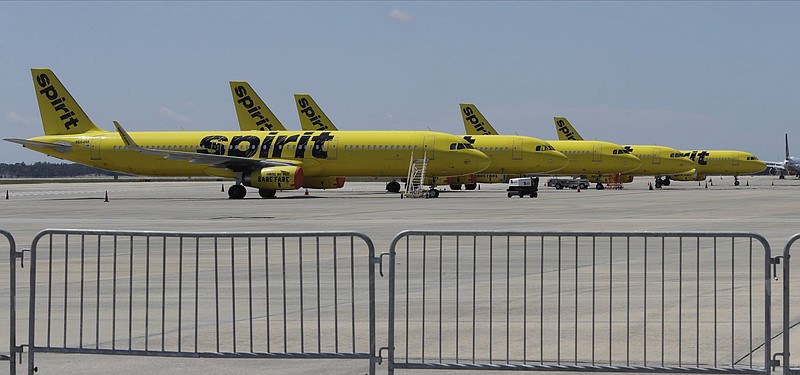Spirit Airlines said Monday that the cancellation of more than 2,800 flights over an 11-day stretch this summer cost the budget airline about $50 million in lost revenue and caused spending to soar.
The airline said the service meltdown that started in late July and a rise in coronavirus cases are causing more last-minute cancellations and softer bookings.
Spirit said that it will reduce flights -- it called the moves "tactical schedule reductions" -- for the rest of the quarter, which ends Sept. 30.
The Miramar, Fla.-based airline made the disclosures in a regulatory filing after the stock market closed Monday.
With all the cancellations, and now fewer flights for the next six weeks, Spirit estimated that its third-quarter revenue will range between $885 million and $955 million, or 4% to 11% below the same quarter in pre-pandemic 2019.
Spirit's cancellation numbers have returned to more normal levels.
In July, Spirit operated 750 flights day, which was a peak for the year as travelers who once felt constrained by the pandemic resumed flying in large numbers this summer. The airline is now operating around 700 daily flights.
However, the airline said that recovering from the crisis caused expenses to climb.
The airline laid out cash to book customers on other airlines and put them up in hotels. Other costs included overtime for workers, the filing said.
Spirit forecast that its third-quarter operating expenses will be slightly above $1 billion -- an increase of up to 20% over the third quarter of 2019.
Spirit said it canceled 2,826 flights from July 30 through Aug. 9 as it dealt with "overlapping challenges" including bad weather, airport staffing shortages, and crews being stranded far from their assigned flights.
On some days during that stretch, the cancellations amounted to more than 60% of the airline's schedule.
Recently, Southwest Airlines and Frontier Airlines made similar statements about customers cancelling because of the spreading coronavirus.
Chief Executive Officer Ted Christie apologized for the disruptions, which affected tens of thousands of customers around the country, while portraying them as out of character for the airline.
"We believe the interruption was a singular event driven by an unprecedented confluence of factors and does not reflect systemic issues," Christie said. He said Spirit has made investments "to be one of the most efficient and reliable airlines in the U.S. industry" and is taking steps "to make sure we maintain that standard."
In recent years, Spirit has scored in the middle of the pack or better for on-time arrivals, as tracked by the federal government. It was third-best last year, behind only Hawaiian Airlines and Delta Air Lines.
However, Spirit has struggled with a high rate of consumer complaints for many years. In 2019, it had the highest rate of complaints among 16 airlines in rankings compiled by the Transportation Department. It improved to 12th out of 16 last year.
Information for this article was contributed by David Koenig of The Associated Press and by David Lyons of the South Florida Sun Sentinel (TNS).

